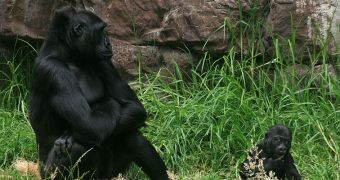Experts at the University of St. Andrews spent the last five years keeping track of gorillas in the San Francisco Zoo, and analyzing how the primates played games, and generally interacted with each other. The study revealed the fact that the gorillas used a variety of equipments, from bags and balls to small pieces of leather, to have fun. Curiously, the older animals were noticed to lower the stakes of the games from time to time, so that younger members of the group could participate as well, the BBC News reports. Most of the games were found to have a competitive nature, the researchers add.
A number of psychologists believe that this line of research could help experts eventually determine the origins of cooperative behaviors in humans as well. It was also discovered during the observations that the primates were able to keep an eye out for others' aims, and related abilities, a fact that proved to alter their own behavior in the games. The investigation was led by researchers Dr. Joanne Tanner and Professor Richard Byrne.
“Just like we would, the gorillas used gestures and displays of the object to keep the action going, and if the game slowed down or stopped a gorilla would use varied tactics to get it going again. The players were also considerate of other's abilities. An older and more skilled gorilla seeming to realize that if it used all of its potential, the younger one wouldn't be able to compete, so the older gorilla would slow down the pace,” Byrne reveals. Anthropologists also say that humans too begin to exhibit a variation of this type of behavior as well, after the newborn baby reaches the age of nine months.
“Though the age at which gorilla games begin may be later in gorillas than in humans, and may depend on the challenges and artifacts available in a particular group's habitat, gorillas definitely enjoy the same kind of sporting competition we do,” Tanner adds. In previous investigations, it was discovered that several species of great apes engaged in this type of activities, even if researchers thought that they were uniquely human. With the new knowledge, scientists can start tracing back the origins of the shared habit, which appear to extend as far back as six million years ago. Details of this investigation appear in the latest issue of the respected journal Animal Cognition.

 14 DAY TRIAL //
14 DAY TRIAL //